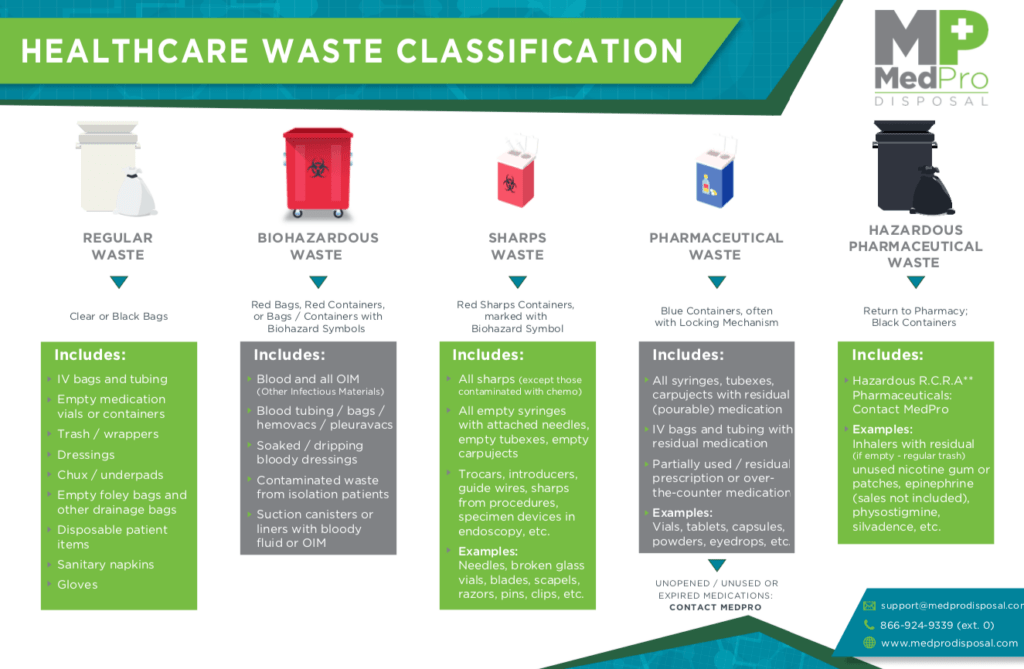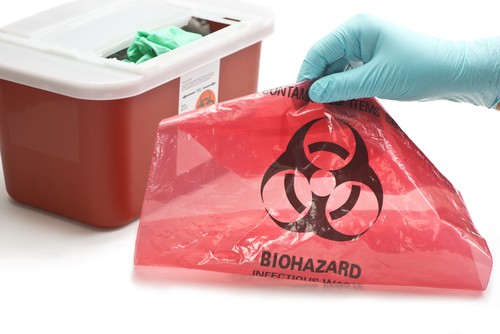Turnkey Medical Waste Removal Service: Seamless Disposal for Health Care Facilities
Wiki Article
Making Certain Safe Handling and Disposal of Medical Waste
Guaranteeing risk-free handling and disposal of medical waste is of paramount importance in healthcare settings. Inappropriate management of medical waste can position considerable threats to the setting, public health, and healthcare workers. This requires adherence to stringent guidelines and procedures for its risk-free handling and disposal. In this intro, we will certainly discover the relevance of correct clinical waste monitoring, the risks associated with incorrect handling and disposal, along with the standards and approaches that can be implemented to ensure its safe disposal. Additionally, we will discuss the significance of training and education for healthcare professionals in order to maintain a tidy and secure healthcare environment. By following these practices, we can efficiently reduce the prospective risks connected with medical waste.Significance of Correct Clinical Waste Monitoring
Correct medical waste administration is of utmost relevance in making sure the safety and health of healthcare specialists, clients, and the public. Medical waste describes any type of waste created by health care centers during the medical diagnosis, treatment, or immunization of pets or humans. This waste can present significant health and wellness threats if not taken care of and thrown away appropriately.
Among the primary reasons correct medical waste administration is critical is to stop the spread of transmittable diseases. Medical waste, such as utilized needles, infected dressings, and biological materials, can bring harmful microorganisms. Otherwise handled and gotten rid of appropriately, these pathogens can be transferred to health care employees, patients, waste handlers, and also the basic public, causing the possible break out of conditions.
Additionally, appropriate medical waste administration aids protect the atmosphere - medical waste removal service. Medical waste consists of harmful products, consisting of chemicals, drugs, and contaminated materials. When not taken care of suitably, these materials can infect dirt, water bodies, and the air, posing a significant hazard to ecological communities and public health and wellness
In addition, reliable medical waste management ensures compliance with global requirements and neighborhood policies. Federal governments and regulatory bodies have developed protocols and guidelines to ensure the secure handling, storage space, transport, and disposal of medical waste. Abiding by these regulations is essential to avoid lawful repercussions and maintain the reputation and reliability of healthcare centers.
Dangers of Improper Handling and Disposal

Clients can additionally be exposed to these infectious diseases if clinical waste is not effectively disposed of. For instance, if contaminated needles or various other sharps are not taken care of in designated puncture-proof containers, they may mistakenly prick clients, causing possible infections. In addition, if medical waste is not set apart effectively, there is a threat of cross-contamination in between different sorts of waste, further enhancing the opportunities of condition transmission.
Inappropriate disposal of medical waste can likewise have destructive effects on the atmosphere and the general public. If clinical waste is not dealt with and taken care of appropriately, it can pollute water sources, dirt, and air, causing the spread of diseases and toxins. This can have lasting repercussions on environments and public wellness.
Standards for Safe Handling of Medical Waste
Implementing efficient methods for the risk-free handling of clinical waste is necessary in making sure the protection of medical care professionals, people, and the general public. These standards are vital in reducing the threats connected with the handling and disposal of clinical waste, such as infections, injuries, and environmental air pollution.Primarily, medical care facilities need to establish a thorough waste administration strategy that complies with regional, nationwide, and international guidelines. This plan ought to consist of clear instructions on waste partition, packaging, storage, transport, and labeling. It is essential to separate different kinds of waste, such as sharps, transmittable materials, pharmaceuticals, and non-hazardous waste, to avoid cross-contamination and promote risk-free disposal.
Furthermore, medical care personnel need to obtain Check Out Your URL complete training on correct waste handling techniques. They must be enlightened on the potential dangers of clinical waste, the appropriate use of personal safety tools (PPE), and the correct procedures for dealing with, carrying, and disposing of different types of waste.
Moreover, health care centers must routinely keep track of and investigate their waste administration methods to make sure compliance with guidelines. This includes carrying out routine inspections, reviewing waste handling procedures, and offering comments and training to personnel members.
Effective Strategies for Waste Disposal
To ensure the safe handling and disposal of medical waste, it is vital to utilize effective strategies for garbage disposal. Clinical waste can present considerable dangers to public health and the environment otherwise managed and taken care of appropriately. As a result, healthcare centers and waste monitoring companies need to execute suitable strategies to minimize these dangers.It includes dividing different kinds of medical waste based on their attributes. Healthcare facilities must provide clear guidelines and training to team members on exactly how to set apart waste correctly.

In addition, healthcare facilities ought to work together with qualified waste management companies to guarantee appropriate disposal of medical waste. These business have the expertise and devices needed to securely get rid of and take care of of clinical waste in conformity with laws and ideal techniques.
Training and Education for Healthcare Professionals
Healthcare professionals play a vital function in making sure the risk-free handling and disposal of medical waste with extensive training and education. It is vital for health care suppliers to have a deep understanding of the possible dangers linked with clinical waste and the appropriate protocols for its monitoring. By obtaining correct training, medical care professionals can lessen the possible transmission of transmittable illness, avoid environmental contamination, and protect both themselves and the public.
Moreover, training programs should highlight the usage of personal safety equipment (PPE) and appropriate hand hygiene practices when managing medical waste. medical waste removal. Health care professionals ought to recognize how to properly dispose and utilize of PPE to shield themselves from potential exposure to harmful products. They should also be informed on the relevance of normal handwashing and the proper use hand sanitizers to lessen the spread of transmittable diseases
Continuing education and normal updates on medical waste monitoring practices are important for medical care professionals. As guidelines and guidelines develop, it is vital to keep healthcare providers informed regarding any kind of changes in protocols and finest methods. This will certainly make certain that they remain updated and keep a high criterion of safety in getting rid of and managing of clinical waste.
Verdict
In conclusion, proper handling and disposal of medical waste is essential to make sure the security of health care specialists, people, and the setting. Ignoring to follow laws and standards can lead to different dangers and dangers. Carrying out efficient methods for garbage disposal and supplying proper training and education for health care professionals are important in maintaining a safe medical care setting. By sticking to these methods, we can reduce the potential threats linked with clinical waste.Clinical waste refers to any type of waste created by medical care facilities throughout the medical diagnosis, treatment, or booster shot of pets or humans. If clinical waste is not segregated effectively, there is a danger of cross-contamination between various types of waste, more boosting the chances of condition transmission.
It is essential to separate various types of waste, such as sharps, infectious products, pharmaceuticals, and non-hazardous waste, to stop cross-contamination and promote risk-free disposal. WasteX Medical Waste Disposal.
To make certain the safe handling and disposal of clinical waste, it is essential to utilize reliable techniques for waste disposal. In addition, healthcare facilities must develop a regular waste collection and transportation schedule to avoid waste build-up and minimize the danger of mishaps or contamination.
Report this wiki page